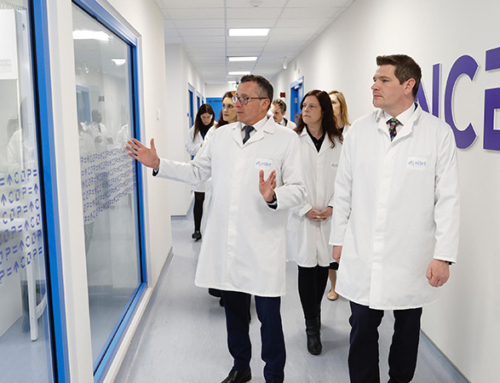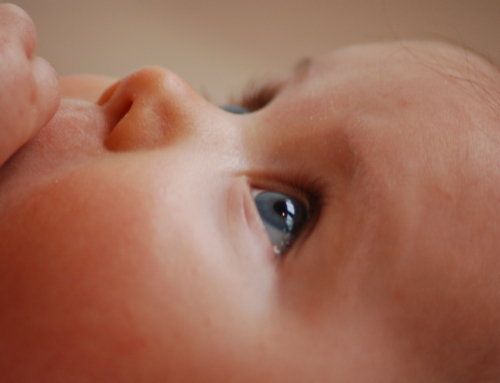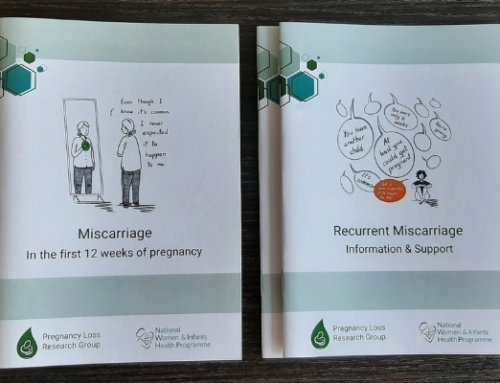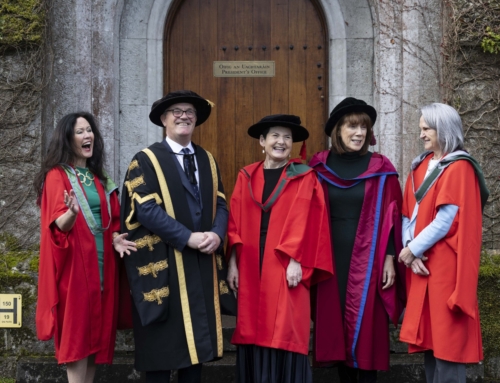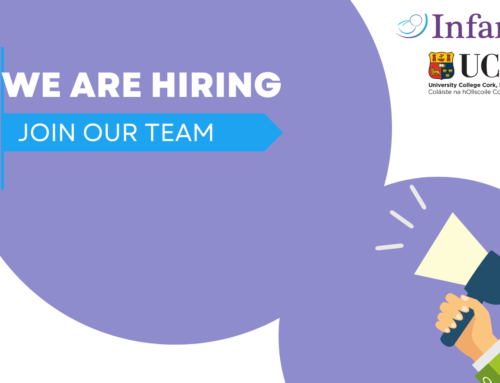Friday 20 March 2020
To celebrate Brain Awareness Week 2020 we asked our INFANT physchologists what a typical working day looks like for them.
Meet Leanna – Clinical Neuropsychologist at INFANT
Please describe your job: What do you do?
I am a Chartered Clinical Neuropsychologist working within the wonderful setting of the INFANT Research Centre, which allows me to be a Scientist and a Practitioner all in one -every Psychologist’s goal and desire! ‘Child Neuropsychology’ is a specialist branch of psychology and neurology that seeks to understand the relationship between the brain and behaviour in children and adolescents. Simply put, it explores how the brain has a direct impact on behavioural, cognitive, and psychosocial adjustment. It attempts to explain the way in which the activity of the brain is expressed in observable and measurable behaviour. I measure this with the help of various specialist assessment tools, diagnostic tools, clinical questionnaires, screeners, parents reports, EEGs, observation and also with the use of novel assessment tools such as ‘Eye-Tracking’. Every day, I am afforded the opportunity to use my training in both Clinical Psychology and Neuropsychology and endeavour to understand why and when something alters, delays or affects brain development during pregnancy, birth and/or early childhood. Thus, I can assess how this may relate to problems exhibited with walking, talking, social and emotional interaction, learning, paying attention, and difficulties at school and/or home. Through these varying assessment techniques, I am informed as to how a child learns best, why they may have learning and behavioural difficulties and consequently put in place the most appropriate strategies and techniques to help these children reach their full potential. Also, it enables me to inform and support parents and teachers where appropriate, through detailed reports and personal feedback. Not only do I get to work with children who may have experienced challenges at birth or after, but I also get to work closely with neurotypical children. This is also important for informing research on normal development. If we do not understand normal development and children’s needs at critical periods of development, we cannot meet these requirements unless we know what to expect in terms of thinking, communication, social and emotional development and physical abilities at certain important time points. One of my main roles as lead Psychologist is to have the responsibility for the delivery and ongoing development of psychological services. Fundamentally, this involves planning, organising, motivating, and delivering a range of initiatives that encourage the application of psychological and neuropsychological principles to support children within the research area. This also enables me to identify ways to improve psychological well-being and aid in supporting parents and children involved in our research, working within the multi-professional team at INFANT.
In striving to learn more about brain and behaviour development across pregnancy and the lifespan of the child, as a Neuropsychologist I have helped to develop an ‘Early Life Lab’. This uses the expertise of new and progressive technologies such as EEG’s, examining brain activity in neurotypical and atypical development, brain function, structure and cognitive processes, and developing an ever-expanding library of neuro-developmental, neuro-cognitive assessments, rating tools, and screeners. The aim of this lab is primarily to continue to integrate neuropsychology services into the specialised multidisciplinary team in order to have neuropsychology as an integral part of several established specialty programs treating a targeted group using a battery of neuropsychological and developmental assessments from birth to early adolescents. Examples of these include high-risk children such as Hypoxic Ischemic Encephalophy (HIE) children, premature babies, seizures and autism spectrum disorders. On a wider platform, I have also been involved and responsible for identifying the development of a ‘Neurodevelopmental follow-up’ work package that will be implemented and followed by all centers in the HRB-Primary Care Clinical Trials Network Ireland. This aims to ensure further best practice and consistency across the networks.
Tell us about a typical working day…
The great thing about my job is that every day is different, varying from day to day and week to week, which adds novelty and excitement. I am part of a multidisciplinary team ranging from research psychologists, engineers, paediatricians, neonatologists, PhD students, medics, physiotherapists, nurses and many more professionals working together on different research projects. I love working closely with other professionals and having a range of responsibilities, such as working with children and their parents and staff, teaching, training, supervision, research and specialist assessments and consultation. I usually start my day by checking emails for any updates and new appointments for assessments or important items to be followed up. Presently, I am involved in the neurodevelopmental assessment of four to five-month babies and eighteen-month toddlers, assessing their language and communication skills, how they are learning, their eye-hand coordination, personal-social-emotional skills, and their gross motor development. Even now, after many years of assessing children, I am fascinated by their ever-developing skills and abilities at this age, their intuition and innate ability to socially engage and wrap you around their little fingers. Four months is my favourite age, as they have not learned to say “No” yet! At 18 months of age, an assessment is very different, but still very similar in what we are assessing. However, at eighteen months they can say “No!”, and also move very quickly. Often, I could end up anywhere in the room, in any position assessing and observing through the use of specialist fun tools. After the assessment, I will score and analyse the results, providing feedback for parents in the form of written reports and verbal feedback. All the anonymised data is then inputted into our database and results analysed and reported on. If there are any concerns in relation to a child’s development, we have a specialist follow-up clinic and clear referral pathways to ensure the child receives the appropriate services necessary to meet these identified needs. I also spend a lot of my time in a consultative role and in the supervision and mentoring of medical students, PhD students, and research psychologists. As a Psychologist, clinical supervision is imperative to our profession: both giving and receiving it. It is a core clinical activity to ensure the delivery of effective and high-quality services. On a regular basis I also input and help to inform policies and procedures within the team, in line with psychological best practice and provision; for example, with regard to child protection, risk assessment and ‘Standard Operation Procedures’ (SOP’s) in relation to psychology input and assessments. An invigorating aspect of my job is my work as a supervisor, mentoring and advising students from UCC, Masters, and Doctorate students on the ‘Applied Psychology’ and the Doctorate in Clinical Psychology’ (D. Clin. UCC) courses. By doing this, we are forging collaborative links with clinical psychology and other branches of psychology offering great experiences to students in the area of supervised research opportunities. Also, preparing and delivering lectures occasionally helps to keep my knowledge and skills up to date.
What do you love about your job?
Every day is different, yet every day always brings a smile and a helping hand. Working in research and within the INFANT platform, nothing is a difficulty or a problem, help is always nearby if needed. The team and the collaboration within are unique, and unlike any other organisation which I have worked in before. I look forward to work every morning, knowing that I can work on my own in a trusted and respected environment, yet also working with a variety of people, and I know I can depend on the team for any knowledge that I do not have in areas that I may know very little about, such as Engineering or Physiology. It is a challenging task attempting to attach EEG leads on the head of a very alert four-month baby! But I am learning, thanks to the team. I love that I still get the opportunity to be a practitioner, and to use my clinical skills to assess the amazing babies and children that are involved in our research studies. It is an incredible opportunity, as I learn so much from these little ones, and from their parents. I experience their resilience, patience, persistence, and the most incredible, unique and informative parenting skills that cannot be learned from any parenting book! Last, and by no means least, as a Psychologist, and as a Scientist-Practitioner, my bread and butter is evidenced-based best practice, informed by research, working with some truly incredible people, and that is what I am lucky enough to do every day, in a nurturing and supportive environment.
What do you find most challenging?
Before I worked in research I worked within a clinical setting with children and adults. Being a clinical neuropsychologist in a research setting is quite different from a clinical setting, where you see patients on a daily basis. Working in a clinical setting you are assessing, formulating and testing hypotheses to diagnose, provide intervention and ongoing support on a regular basis. In research it is different in that we use experimental methods and statistics, using scientific methods to formulate and test hypotheses, develop experiments, collect and analysis data and use that information to develop conclusions and report on the findings. One of the most challenging aspects of this role change when I first began working in INFANT, was that I was assessing purely for research outcomes, not to provide intervention, therapy or ongoing support; therefore, I had a very different hat on! A further challenge for me, as in all research, I would think, is that every day brings a new research question, new ideas, and new thoughts, but unfortunately only one at a time! Research takes time and a great deal of patience.
Do you have any advice for anybody who wants to work in your field?
I am an oldie in Psychology! I am very lucky in this respect, as when I applied many moons ago for my clinical training, it was not as difficult, and certainly not as incredibly competitive as it is today. Getting on the ‘Clinical Doctorate’ is tough enough in itself, and then another long pathway lies ahead in order to become a Neuropsychologist. But the fantastic thing about becoming a clinical psychologist is that all along the way, you are gaining incredible practical experience and transferable skills that will help you in all areas of life. Also, you acquire skills that are transferable and valuable in other areas of work. Gain experience. That is the one essential component for advancing in this field of work; strengthen your desire and determination to become a Psychologist through your supervised experience in the field. The rewards of seeing a smile on someone’s face, or the thought you may have enabled someone to make a little change that will have an everlasting impact on their life or their child’s, is well worth the wait. To be able to inform clinical practice through research is an absolute privilege.



